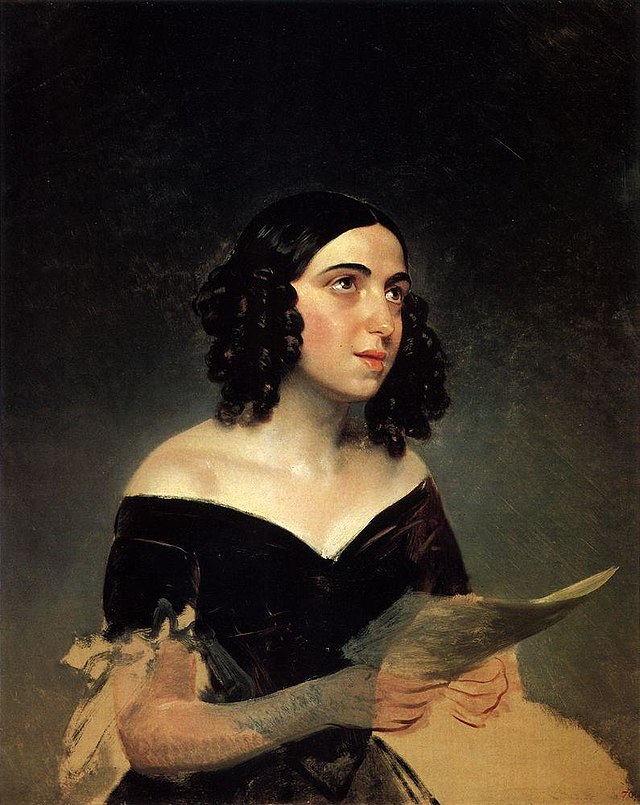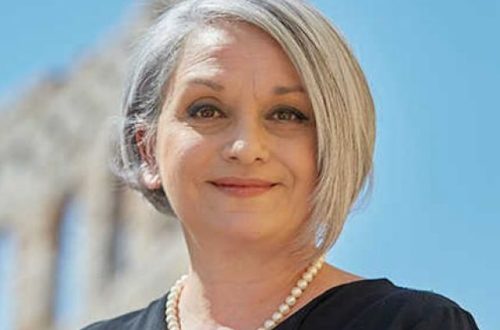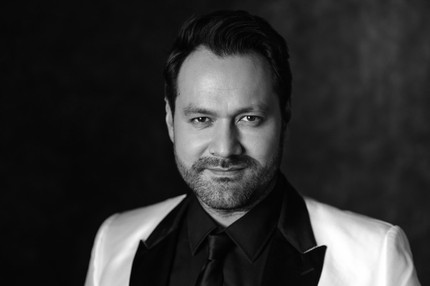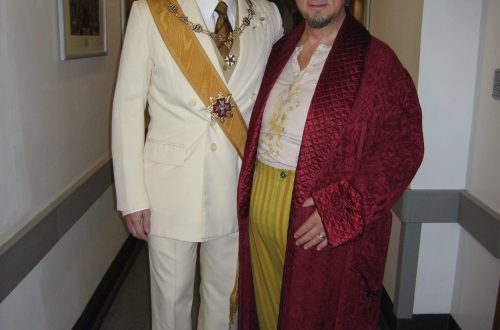
Anna Yakovlevna Petrova-Vorobieva |
Anna Petrova-Vorobieva
Not long, only thirteen years, the career of Anna Yakovlevna Petrova-Vorobyeva lasted. But even these years are enough to inscribe her name in the history of Russian art in golden letters.
“… She had a voice of phenomenal, rare beauty and strength, a “velvet” timbre and a wide range (two and a half octaves, from “F” small to “B-flat” the second octave), a powerful stage temperament, owned a virtuoso vocal technique,” writes Pruzhansky. “In each part, the singer strived to achieve complete vocal and stage unity.”
One of the singer’s contemporaries wrote: “She will just come out, now you will notice a great actress and an inspired singer. At this moment, her every movement, every passage, every scale is imbued with life, feeling, artistic animation. Her magical voice, her creative play is equally asking for in the heart of every cold and fiery lover.
Anna Yakovlevna Vorobieva was born on February 14, 1817 in St. Petersburg, in the family of a tutor in the choirs of the Imperial St. Petersburg theatres. She graduated from the St. Petersburg Theater School. First she studied in the ballet class of Sh. Didlo, and then in the singing class of A. Sapienza and G. Lomakin. Later, Anna improved in vocal art under the guidance of K. Kavos and M. Glinka.
In 1833, while still a student at the theater school, Anna made her debut on the opera stage with a small part of Pipo in Rossini’s The Thieving Magpie. Connoisseurs immediately noted her outstanding vocal abilities: contralto rare in strength and beauty, excellent technique, expressiveness of singing. Later, the young singer performed as Ritta (“Tsampa, the sea robber, or the Marble Bride”).
At that time, the imperial stage was almost completely given over to the Italian opera, and the young singer could not fully reveal her talent. Despite her success, after graduating from college, Anna was appointed by the director of the Imperial Theaters A. Gedeonov to the choir of the St. Petersburg Opera. During this period, Vorobyeva took part in dramas, vaudeville, various divertissement, performed in concerts with the performance of Spanish arias and romances. Only thanks to the efforts of K. Cavos, who appreciated the voice and stage talent of the young artist, she got the opportunity to perform on January 30, 1835 as Arzache, after which she was enrolled as a soloist of the St. Petersburg Opera.
Having become a soloist, Vorobieva began to master the “belkanto” repertoire – mainly operas by Rossini and Bellini. But then an event occurred that abruptly changed her fate. Mikhail Ivanovich Glinka, who began work on his first opera, distinguished two among many singers of Russian opera with the unmistakable and penetrating gaze of the artist, and chose them to perform the main parts of the future opera. And not only elected, but also began to prepare them for the fulfillment of a responsible mission.
“The artists played parts with me with sincere zeal,” he later recalled. “Petrova (then still Vorobyova), an unusually talented artist, always asked me to sing to her every new music for her twice, the third time she already sang the words and music well and knew by heart … “
The singer’s passion for Glinka’s music grew. Apparently, even then the author was satisfied with her success. In any case, at the end of the summer of 1836, he had already written a trio with a choir, “Ah, not for me, the poor, the violent wind,” in his own words, “considering the means and talent of Ms. Vorobyeva.”
On April 8, 1836, the singer acted as a slave in the drama “Moldavian Gypsy, or Gold and Dagger” by K. Bakhturin, where at the beginning of the third picture she performed an aria with a female choir written by Glinka.
Soon the premiere of Glinka’s first opera, historical for Russian music, took place. V.V. Stasov wrote much later:
On November 27, 1836, Glinka’s opera “Susanin” was given for the first time…
The performances of Susanin were a series of celebrations for Glinka, but also for the two main performers: Osip Afanasyevich Petrov, who played the role of Susanin, and Anna Yakovlevna Vorobyeva, who played the role of Vanya. This latter was still a very young girl, only a year out of theater school and until the very appearance of Susanin condemned to crawl in the choir, despite her amazing voice and abilities. From the very first performances of the new opera, both of these artists rose to such a height of artistic performance, which until then no one of our opera performers had reached. By this time, Petrov’s voice had received all its development and became that magnificent, “powerful bass” about which Glinka speaks in his Notes. Vorobieva’s voice was one of the most extraordinary, amazing contraltos in all of Europe: volume, beauty, strength, softness – everything in it amazed the listener and acted on him with irresistible charm. But the artistic qualities of both artists left far behind the perfection of their voices.
Dramatic, deep, sincere feeling, capable of reaching amazing pathos, simplicity and truthfulness, ardor – that’s what immediately put Petrov and Vorobyova in first place among our performers and made the Russian public go in crowds to the performances of “Ivan Susanin”. Glinka himself immediately appreciated all the dignity of these two performers and sympathetically took up their higher artistic education. It is easy to imagine how far talented, already richly gifted artists by nature had to step forward, when a brilliant composer suddenly became their leader, adviser and teacher.
Shortly after this performance, in 1837, Anna Yakovlevna Vorobyeva became Petrov’s wife. Glinka gave the newlyweds the most expensive, priceless gift. Here is how the artist herself tells about it in her memoirs:
“In September, Osip Afanasyevich was very concerned about the idea of what to give him as a benefit scheduled for October 18th. In the summer, during the wedding chores, he completely forgot about this day. In those days … each artist had to take care of composing the performance himself, but if he didn’t come up with anything new, but didn’t want to give the old one, then he risked completely losing the benefit performance (which I once experienced on myself), those were then the rules. October 18th is not far off, we must decide on something. Interpreting in this way, we came to the conclusion: would Glinka agree to add one more scene for Vanya to his opera. In Act 3, Susanin sends Vanya to the manor’s court, so it would be possible to add how Vanya runs there?
My husband immediately went to Nestor Vasilyevich Kukolnik to tell about our idea. The puppeteer listened very carefully, and he said: “Come, brother, in the evening, Misha will be with me today, and we will talk.” At 8 o’clock in the evening, Osip Afanasyevich went there. He enters, sees that Glinka is sitting at the piano and humming something, and the Puppeteer is pacing around the room and muttering something. It turns out that the Puppeteer has already made a plan for a new scene, the words are almost ready, and Glinka is playing out a fantasy. Both of them seized on this idea with pleasure and encouraged Osip Afanasyevich that the stage would be ready by October 18th.
The next day, at 9 am, a strong call is heard; I haven’t gotten up yet, well, I think, who is it that came so early? Suddenly someone knocks on the door of my room, and I hear Glinka’s voice:
– Lady, get up quickly, I brought a new aria!
In ten minutes I was ready. I go out, and Glinka is already sitting at the piano and showing Osip Afanasyevich a new scene. One can imagine my surprise when I heard her and was convinced that the stage was almost completely ready, i.e. all recitatives, andante and allegro. I just froze. When did he have time to write it? Yesterday we were talking about her! “Well, Mikhail Ivanovich,” I say, “you are just a sorcerer.” And he just smiles smugly and says to me:
– I, mistress, brought you a draft, so that you could try it by voice and whether it was deftly written.
I sang and found that deftly and in voice. After that, he left, but promised to send an aria soon, and to orchestrate the stage by the beginning of October. On October 18, Osip Afanasyevich’s benefit performance was the opera A Life for the Tsar with an additional scene, which was a huge success; many called the author and performer. Since then, this additional scene has become part of the opera, and in this form it is performed to this day.
Several years passed, and the grateful singer was able to adequately thank her benefactor. It happened in 1842, in those November days, when the opera Ruslan and Lyudmila was first performed in St. Petersburg. At the premiere and at the second performance, due to Anna Yakovlevna’s illness, the part of Ratmir was performed by the young and inexperienced singer Petrova, her namesake. She sang rather timidly, and in many respects for this reason the opera was received coldly. “The eldest Petrova appeared at the third performance,” writes Glinka in her Notes, “she performed the scene of the third act with such enthusiasm that she delighted the audience. Loud and prolonged applause resounded, solemnly summoning first me, then Petrova. These calls continued for 17 performances … ”We add that, according to the newspapers of that time, the singer was sometimes forced to encore Ratmir’s aria three times.
V.V. Stasov wrote:
“Her main roles, during her 10-year stage career, from 1835 to 1845, were in the following operas: Ivan Susanin, Ruslan and Lyudmila – Glinka; “Semiramide”, “Tancred”, “Count Ori”, “The Thieving Magpie” – Rossini; “Montagues and Capulets”, “Norma” – Bellini; “The Siege of Calais” – Donizetti; “Teobaldo and Isolina” – Morlacchi; “Tsampa” – Herold. In 1840, she, together with the famous, brilliant Italian Pasta, performed “Montagues and Capuleti” and led the audience into indescribable delight with her passionate, pathetic performance of the part of Romeo. In the same year she sang with the same perfection and enthusiasm the part of Teobaldo in Morlacchi’s Teobaldo e Isolina, which in its libretto is very similar to Montagues and Capulets. Regarding the first of these two operas, Kukolnik wrote in Khudozhestvennaya Gazeta: “Tell me, from whom did Teobaldo take over the wondrous simplicity and truth of the game? Only the abilities of the highest category are allowed to guess the limit of the elegant with one inspired presentiment, and, captivating others, are themselves carried away, enduring to the end the growth of passions, and the strength of the voice, and the slightest shades of the role.
Opera singing is the enemy of gesticulation. There is no artist who would not be at least somewhat ridiculous in opera. Ms. Petrova in this respect strikes with amazement. Not only is it not funny, on the contrary, everything in her is picturesque, strong, expressive, and most importantly, truthful, true! ..
But, without a doubt, of all the roles of a talented artistic couple, the most outstanding in terms of strength and truth of historical color, in depth of feeling and sincerity, in inimitable simplicity and truth, were their roles in Glinka’s two great national operas. Here they have never had any rivals until now.”
Everything that Vorobyeva sang denounced in her a first-class master. The artist performed the virtuoso Italian parts in such a way that she was compared with the famous singers – Alboni and Polina Viardo-Garcia. In 1840, she sang with J. Pasta, not losing in skill to the famous singer.
The brilliant career of the singer turned out to be short. Due to the large voice load, and the theater management forced the singer to perform in male parts, she lost her voice. This happened after the performance of the baritone part of Richard (“The Puritans”). So in 1846 she had to leave the stage, although officially Vorobyova-Petrova was listed in the opera troupe of the theater until 1850.
True, she continued to sing both in salons and in the home circle, still delighting listeners with her musicality. Petrova-Vorobyeva was famous for her performances of romances by Glinka, Dargomyzhsky, Mussorgsky. Glinka’s sister L.I. Shestakova recalled that, when she first heard Mussorgsky’s The Orphan, performed by Petrova, “at first she was amazed, then burst into tears so that she could not calm down for a long time. It is impossible to describe how Anna Yakovlevna sang, or rather expressed; one must hear what a man of genius can do, even if he has completely lost his voice and is already in advanced years.
In addition, she took a lively part in the creative success of her husband. Petrov owes a lot to her impeccable taste, subtle understanding of art.
Mussorgsky dedicated to the singer Marfa’s song “A Baby Came Out” from the opera “Khovanshchina” (1873) and “Lullaby” (No. 1) from the cycle “Songs and Dances of Death” (1875). The art of the singer was highly appreciated by A. Verstovsky, T. Shevchenko. The artist Karl Bryullov, in 1840, having heard the voice of the singer, was delighted and, according to his confession, “could not resist tears …”.
The singer died on April 26, 1901.
“What did Petrova do, how did she deserve such a long and cordial memory in our musical world, which has seen many good singers and artists who devoted a much longer period of time to art than the late Vorobyova? wrote the Russian Musical Newspaper in those days. – And here’s what: A.Ya. Vorobyova together with her husband, the late glorious singer-artist O.A. Petrov, were the first and brilliant performers of the two main parts of Glinka’s first Russian national opera Life for the Tsar – Vanya and Susanin; AND I. Petrova was at the same time the second and one of the most talented performers of the role of Ratmir in Glinka’s Ruslan and Lyudmila.





